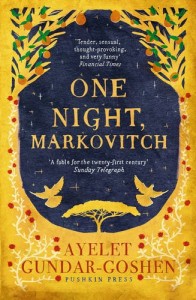 Translated by Sondra Silverston
Translated by Sondra Silverston
Published by Pushkin Press 18 June 2015
384pp, paperback, £8.99
Reviewed by Elizabeth Hilliard Selka
At a glance, this novel delightfully revisits the plot of The Taming of the Shrew: luscious and feisty Bella (geddit?) is allocated to decent but ordinary Yaacov Markovitch in a fictionalized account of a real-life scheme which helped young women escape Nazi-dominated Europe by marrying them to Jewish men who came to Europe for the purpose, with the proviso that once in Palestine they would immediately be divorced and free to live and work. Yaacov, however, is bowled over by Bella and refuses to provide the expected divorce. This too is apparently based on a true story of one of the rescued women and her husband. Cue witty romantic comedy, surely, in which Yaacov becomes a better man and Bella is redeemed by falling in love with him? The two are eventually united, after conflict and adventure, and live happily ever after?
Actually no, not so. For a start, Yaacov Markovitch is not the only man involved with the scheme, and Bella is not the only woman. The story is as much about his friend Zeev Feinberg; Sonya, the woman Zeev loves; Rachel Mandelbaum, the woman to whom he is caught, by Yaacov, making love in the early pages; and Rachel’s husband Avreham, a butcher. Then there’s Ephraim Froike, deputy commander of the Irgun (the Zionist paramilitary organization that operated in British Mandate Palestine, if you didn’t already know) whose life is entwined with Zeev Feinberg’s in various ways, starting with a game of chess on board the ship taking them both to Palestine for the first time. Then these characters start breeding, begetting another generation whose stories interweave, and yet further characters enter from stage left when the story is well established.
Confused? It is a tribute to Ayelet Gundar-Goshen’s clarity and lightness of touch, her lively language and charming delivery, that one doesn’t chuck the book aside in exasperation. And to Sondra Silverston’s beautiful translation, though there is the occasional small slip where, for example, she mistakes disinterested (as in interested but impartial) for uninterested (as in detached). And also to the fact that the male characters are almost invariably, and rather chirpily, referred to by their full name, Yaacov Markovitch for example, and Froike almost never by his name at all, but simply as the ‘deputy commander of the Irgun’. This goes some way to helping us keep a grasp on whom is doing what in this labyrinthine tale, which matters especially because quite quickly we care very much what becomes of them all.
As for romantic comedy… There is lots of sex and sensuality, but this story reflects the complicated and often heartbreaking passions, politics and violence of that region in this period which are far from funny, though many funny moments are to be had, especially in the first half. Thereafter the tale becomes progressively darker, until under a cloud of foreboding it does indeed end sadly, if not entirely badly, a triumph of storytelling over optimism. This novel is a wonderful read, heartfelt and sensual and entertaining, but possibly not one for the beach.
